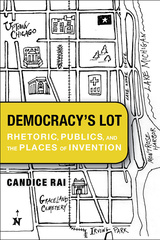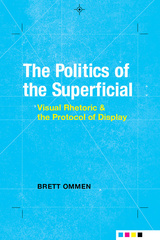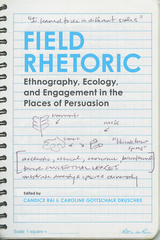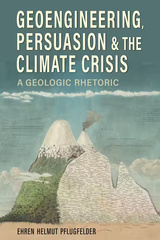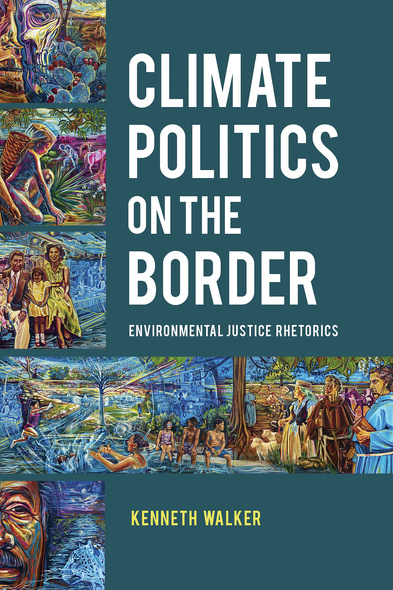
216 pages, 6 x 9
9 B&W figures - 1 map
Hardcover
Release Date:15 Mar 2022
ISBN:9780817321116
Climate Politics on the Border
Environmental Justice Rhetorics
University of Alabama Press
Explores the ways climate change and extreme weather are negotiated politically in a border community
As a borderland city with generations of slow violence and extreme weather events like flash flooding and intense heat waves, San Antonio, Texas, speaks directly to global issues in climate politics. In Climate Politics on the Border: Environmental Justice Rhetorics, Kenneth Walker takes a place-based approach to his study of San Antonio to explore how extreme weather events and responses to them shape local places, publics, and politics, with an eye toward a future characterized by severe climate breakdown.
Attending to the local histories and micropolitics of San Antonio, Walker examines the effects of extreme weather events as they are experienced across radically inequitable social categories. These local histories serve as a guide, not just for future climates, which stand to be unprecedented, but for the necessary public and political responses to them. He shows how extreme weather events in the past have reinforced colonial social orders that weaken democratic goals of pluralism and equity. Conversely, he also shows how diverse coalitions have resisted and responded to these forces.
Walker examines the ethics of Latinx and Anglo relations within state-sponsored productions of racial inequity and environmental degradation, the coalitional capacities of environmental activists and second-wave Chicana/o organizations to protect clean water and transform local political representation, the obligations of place-keeping in Latinx urban design and ecological restoration, and the need to foster pluriversal worlds in city-level climate action and adaptation plans. Collectively these chapters rethink tropes of adaptation, resilience, and coalition as rhetorical and ecological capacities for public and political responses to extractivism.
Based on years of archival work and fieldwork, Climate Politics on the Border demonstrates vividly why ecological and anticolonial approaches to rhetoric are essential for grappling with climate politics. Overall, this is a timely study of how environmental degradation, pollution, and climate change are disputed and negotiated at the local political level in a borderland community.
As a borderland city with generations of slow violence and extreme weather events like flash flooding and intense heat waves, San Antonio, Texas, speaks directly to global issues in climate politics. In Climate Politics on the Border: Environmental Justice Rhetorics, Kenneth Walker takes a place-based approach to his study of San Antonio to explore how extreme weather events and responses to them shape local places, publics, and politics, with an eye toward a future characterized by severe climate breakdown.
Attending to the local histories and micropolitics of San Antonio, Walker examines the effects of extreme weather events as they are experienced across radically inequitable social categories. These local histories serve as a guide, not just for future climates, which stand to be unprecedented, but for the necessary public and political responses to them. He shows how extreme weather events in the past have reinforced colonial social orders that weaken democratic goals of pluralism and equity. Conversely, he also shows how diverse coalitions have resisted and responded to these forces.
Walker examines the ethics of Latinx and Anglo relations within state-sponsored productions of racial inequity and environmental degradation, the coalitional capacities of environmental activists and second-wave Chicana/o organizations to protect clean water and transform local political representation, the obligations of place-keeping in Latinx urban design and ecological restoration, and the need to foster pluriversal worlds in city-level climate action and adaptation plans. Collectively these chapters rethink tropes of adaptation, resilience, and coalition as rhetorical and ecological capacities for public and political responses to extractivism.
Based on years of archival work and fieldwork, Climate Politics on the Border demonstrates vividly why ecological and anticolonial approaches to rhetoric are essential for grappling with climate politics. Overall, this is a timely study of how environmental degradation, pollution, and climate change are disputed and negotiated at the local political level in a borderland community.
The topic of how local communities should respond to the growing challenge of extreme weather events has become increasingly salient with the accumulation of aggregated effects of global warming. This is especially so in southern Texas, an area which has recently experienced many such weather events . . . Walker finds that political responses to the city's disasters during the early colonial period were colored by a divisive micropolitics that allowed for unequal treatment of citizens based on race, and that these conditions continue to operate in the present. Walker argues that it is vital that local communities develop strategies that foster cooperation, resilience, and recovery. Highly recommended.’ —CHOICE
‘Kenneth Walker’s Climate Politics on the Border is a stunningly complex book. By probing the intense place-based relationship between extreme weather and those who endure it, he decodes the social and racial hierarchies that shape the human experience of a supercharged climate. In San Antonio, long racked by flash floods and slow violence, Walker has identified the perfect site to test the world to come.’
—Char Miller, author of Not So Golden State: Sustainability vs. the California Dream
‘This stirring book merges cultural studies with a de-colonialist conscience, Indigenous, Texan and Tejano historiography, alongside rigorous rhetorical analysis of contrasting local narratives of nature and heavy weather spanning the deep history of San Antonio, Texas. Through this original amalgam of sources and critical methodologies, Kenneth Walker reveals an epic of underlying stories about a place where myriad peoples imagined distinct versions of how the city was situated in the natural world. Just in the nick of time, it’s a strikingly groundbreaking work that urgently connects scholarship to an emerging Borderlands ecological activism for the 21st century.’
—John Phillip Santos, author of Places Left Unfinished at the Time of Creation
Climate Politics on the Border doesn’t just acknowledge that environmental justice and decoloniality are inextricably linked; it provides rich theoretical language for analyzing those links and robust practical insight for working from them. Read this book for the rhetorical history it illuminates and for the multispecies, intersectional, ecological future toward which it orients rhetorical studies.’
—Christa J. Olson, author of American Magnitude: Hemispheric Vision and Public Feeling in the United States
‘Dr. Walker is an innovative, masterful writer and Climate Politics on the Border reflects interdisciplinarity at its best. The book is meticulously researched, using one of the best articulations of decoloniality, and drawing from the theorists of the Global South as well as from rhetorical studies. Of significant importance is the fact that he also cites usually marginalized theorists of color throughout the manuscript. The book is analytically rigorous and makes an ambitious case for pluriversality.’
—Sonia Saldivar-Hull, author of Feminism on the Border: Chicana Gender Politics and Literature
In an age of climate emergency, we need to become more attuned to the pluriversal ways we connect and disconnect across disciplinary, methodological, cultural, ecological, and political boundaries. This book rethinks rhetorical science studies through identifying the reciprocal and inequitable relationships that constitute flooding impacts in San Antonio. Creative and provocative, Walker’s ambitious project goads us all to become more invested in troubling the borders that define and undo us.’
—Phaedra C. Pezzullo, coeditor of Green Communication and China: On Crisis, Care, and Global Futures
Kenneth Walker is assistant professor of rhetoric in the Department of English at the University of Texas at San Antonio. His work has been published in Rhetoric Society Quarterly, Rhetoric Review, POROI, Technical Communication Quarterly, and Environmental Humanities.






